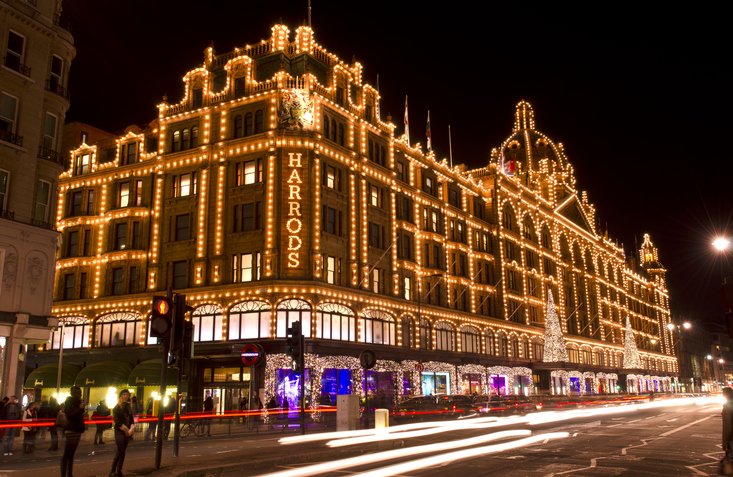Sales staff in the fur salon at London’s Harrods department store provided misleading information about conditions for animals on fur farms to a secret shopper, who was filming for animal protection charity Humane Society International/UK.
Sales staff representing global designers Yves Salomon, Moncler and Max Mara – all wearing Harrods-branded name badges – made misleading claims about the deprived environment in which caged animals are kept, and the way they are killed, when questioned about farmed fox fur from Finland.
Conditions ‘like Battersea’
The sales rep for Yves Salomon falsely claimed that foxes on fur farms are not kept in cages, telling the undercover customer that they are kept in ‘their own private space’ in ‘separate rooms’ – ‘exactly’ like Battersea (Dogs and Cats Home).
The customer was repeatedly told that foxes are not kept in a cage and even that ‘they have enough space to play and everything’.
In truth, the animals are confined in small, barren, wire factory-farm style cages one-metre squared.
These pitiful conditions were exposed this week in HSI’s undercover investigation at three Finnish fox fur farms that showed animals in cages barely longer than their body length, nose to tail.
Many of the foxes also suffered with deformed feet and diseased eyes.
’It’s only propaganda, madam’
Another Yves Salomon sales rep at Harrods gave HSI/UK’s undercover shopper the false assurance that before the animals are killed ‘they put them down with an injection’ so that ‘they are literally put to sleep.’
In truth foxes (and raccoon dogs) are anally electrocuted without any anaesthetic.
When our shopper expressed concern about some videos she had seen of animals suffering in the fur trade she was told ‘it’s only propaganda, madam’.
Moncler’s sales assistant made the astonishing implication that its Finnish fox fur was just a by-product, saying ‘we take our fur from animals who were already taken for other purposes, like for example meat or something else’, despite the breeding of foxes for human consumption being illegal in the EU.
‘A whole new level of delusion’
Humane Society International/UK which leads the #FurFreeBritain campaign for a UK fur sales ban, and Finnish animal campaigners Oikeutta Eläimille, visited three fur farms in the Ostrobothnia region of Finland.
Finland has exported more than £11 million of fur to the UK since 2000, despite the same fur farm cruelty being banned in the UK.
Max Mara’s sales staff told the investigator that its fur is certified by the fur trade’s SAGA Furs assurance scheme which, they claimed, means ‘those ones are not cruel, not made in a cruel way…. It means that the animals don’t suffer.’
However, at two SAGA Furs certified fox fur farms visited by HSI/UK, foxes with infected eyes and missing ears were filmed in woefully cramped cages, each one empty but for a single piece of wood or bone which passes for ‘enrichment’.
Fox fur originating from Finland is used by brands including Fendi, Moncler, Yves Salomon, Woolrich, Herno and Max Mara, and is seen in stores including Harrods, Harvey Nichols and Flannels.
Fur in the UK
Finland is the biggest producer of fox fur in Europe and the second biggest in the world, exporting millions of pounds’ worth of fur around the world including to the UK.
Since banning fur farming in 2000 on ethical grounds, the UK has imported more than £850 million of fur from a range of countries including France, Italy, Poland, China and the United States.
Through its #FurFreeBritain campaign, HSI/UK is urging the government to end this by banning UK fur imports and sales, a move supported by 72% of the British public.
The government is currently considering a fur sales ban and recently held a public consultation which received 30,000 responses.
 Play Video about This Rock Might Just Save The World
Play Video about This Rock Might Just Save The World Play Video about Play 2 hours of rock
Play Video about Play 2 hours of rock Play Video about Play 2 hours of brook
Play Video about Play 2 hours of brook Play Video about Play 2 hours of sheep
Play Video about Play 2 hours of sheep











































